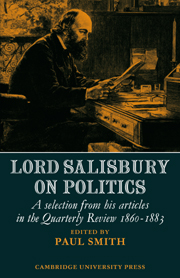Book contents
- Frontmatter
- Contents
- Preface
- List of abbreviations
- Editor's introduction
- Bibliographical note
- ‘The Budget and the Reform Bill’ (April 1860)
- ‘The House of Commons’ (July 1864)
- ‘The Reform Bill’ (April 1866)
- ‘The Change of Ministry’ (July 1866)
- ‘The Conservative Surrender’ (October 1867)
- ‘The Programme of the Radicals’ (October 1873)
- ‘Disintegration’ (October 1883)
- Index
- Cambridge Studies in the History and Theory of Politics
‘The Change of Ministry’ (July 1866)
Published online by Cambridge University Press: 06 July 2010
- Frontmatter
- Contents
- Preface
- List of abbreviations
- Editor's introduction
- Bibliographical note
- ‘The Budget and the Reform Bill’ (April 1860)
- ‘The House of Commons’ (July 1864)
- ‘The Reform Bill’ (April 1866)
- ‘The Change of Ministry’ (July 1866)
- ‘The Conservative Surrender’ (October 1867)
- ‘The Programme of the Radicals’ (October 1873)
- ‘Disintegration’ (October 1883)
- Index
- Cambridge Studies in the History and Theory of Politics
Summary
INTRODUCTORY NOTE
By the time the next issue of the Quarterly appeared, in July 1866, the political scene had changed sharply. Gladstone's attempt to drive Reform through a Palmerstonian House of Commons had collapsed, taking the government with it, Derby had come into office, and Cranborne was a cabinet minister at the age of thirty-six. His July article surveyed the convulsion, and the prospects which it opened up.
The struggle over the Reform Bill had been a classic contest. The debates produced some of the finest parliamentary oratory of the nineteenth century, with Robert Lowe's anti-Reform speeches taking the first place. The determination of Gladstone to carry Reform was matched by the determination of the Conservatives and the Whig and Liberal dissidents who were dubbed ‘Adullamites’ to stop it. In conjunction with the Adullamites, among whom Lowe, Elcho, Grosvenor, and Horsman were especially prominent, the Conservatives waged a steady guerilla campaign against the progress of the government bill. The first major challenge came when the Whig Earl Grosvenor, M.P. for Chester, was persuaded to move an amendment on the second reading postponing discussion of the franchise bill until the promised redistribution measure was also before the House. The point of this amendment, seconded by Derby's son, Lord Stanley, was to intensify the government's difficulties by bringing into play against it the fears of those whose interests redistribution would threaten, and it was persisted with even after Russell decided to introduce the redistribution bill before the franchise bill reached the committee stage.
- Type
- Chapter
- Information
- Lord Salisbury on PoliticsA selection from his articles in the Quarterly Review, 1860-1883, pp. 226 - 252Publisher: Cambridge University PressPrint publication year: 1972

